Розробка уроку з англійської мови "Mission to Mars"
Розробка уроку з англійської мови "Mission to Mars" для учнів 10-11 класів з елементами відео( посилання на відео в уроці) Містить різноманітні завдання.
Хід заняття
The topic of the lesson “Mission to Mars”
Objectives: By the end of the lesson students will be able to: communicate by eliciting personal experience and knowledge; use their knowledge in other educational spheres; express opinions on the subject; use new vocabulary in speaking and writing; change their thoughts in the classroom; make questions using the lessons’ vocabulary; take part in role play; become more confident in their knowledge; speak about Mars planer and their vegetable gardens.
Type of the lesson: combined lesson
Equipment: the students book “Laser” B2, Power Point Presentation “Mars”, computer, cards, video from TED channel, multimedia projector.
I. Привітання (1хв)
Greeting
Teacher: Hello, students!
Students: Hello, teacher!
II. Введення нового лексичного матеріалу (6 хв)
Teacher: Today we are going to learn some interesting topic, we speak about Mars. But before we start reading a text I would like that you in pairs talk about these words which you see on the blackboard.
humans / Mars / agency / astronauts / journey / return / fruit / vegetables / soil / Martian / gardens / volcanic / rock / nutrients / organic material / discoveries / Earth
Students discuss
Teacher: What can you say about these words and your life?
Students give answers
Teacher: Spend one minute writing down all of the different words you associate with the word "space". Share your words with your partner(s) and talk about them.
Students give answers
Teacher: Well done! And now rank these with your partner. Put the things you want to happen most the top. Change partners often and share your rankings.
- download skills to brain
- typing by thought
- recording dreams
- healthy forever pills
- holidays in space
- jet-backpacks
- cities on Mars
- live to be 200
Students rank these fictions and discuss it
Teacher: I ask you to find other meanings, information, synonyms … for the words 'space' and 'agency'. Students find other meaning and share it in the classroom
III. Головна частина заняття
Listening, reading, speaking, doing different exercises
Teacher: We live in such big world and even now we don’t know exactly is there any life on other planets? Scientists try find out more about space, planets. Some students prepare presentations.
1. Презентації студентів. Студенти виступають, після кожної презентації обговорення. (14 хв)
Students introduce the presentation, discuss
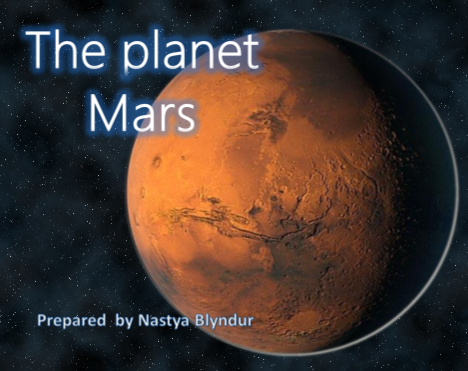
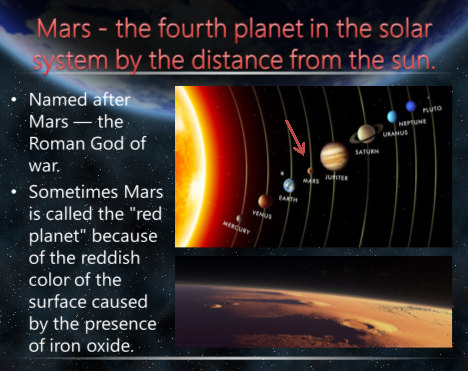
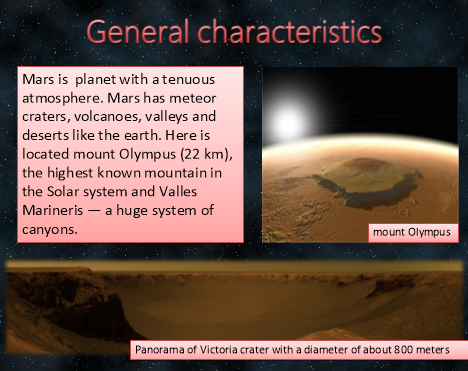
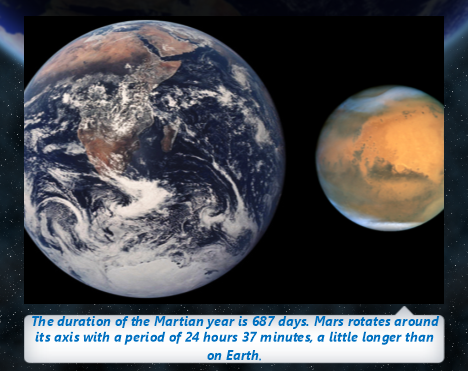
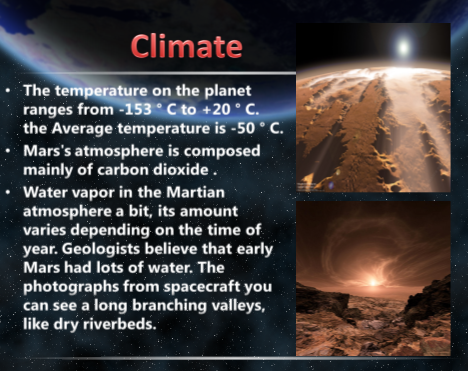
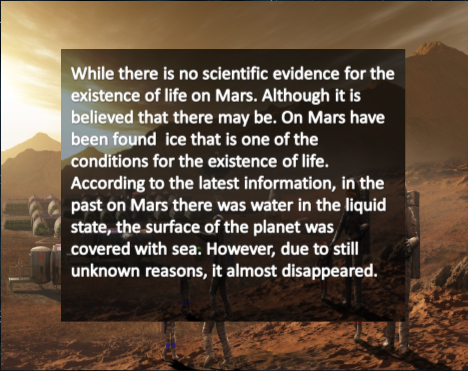
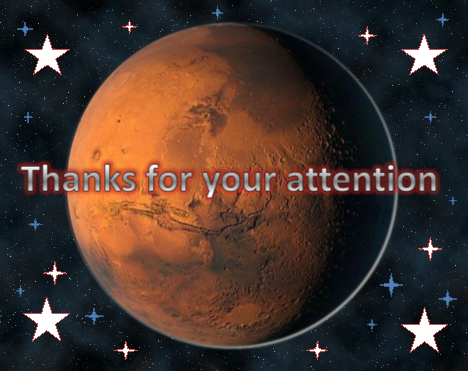
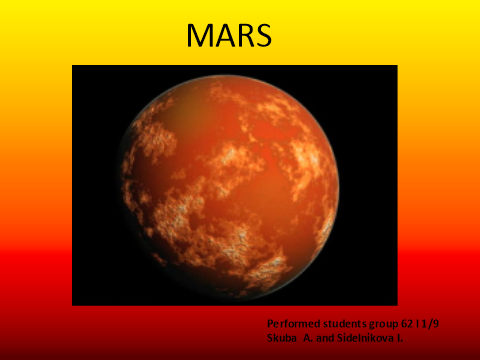
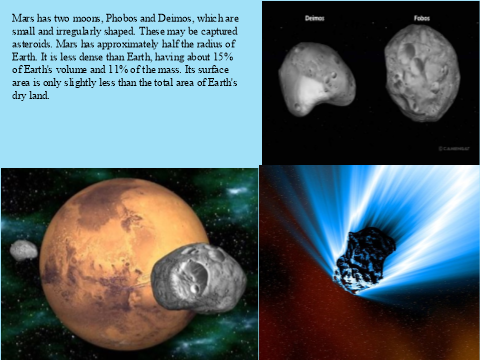
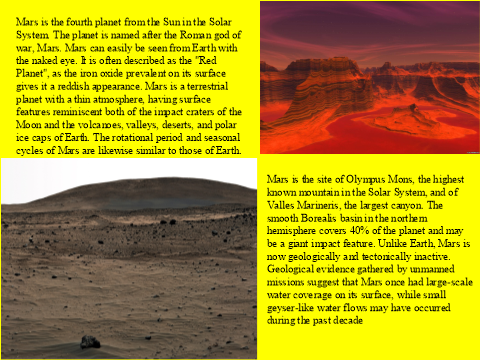
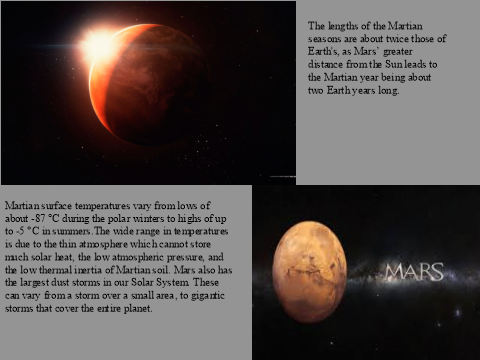
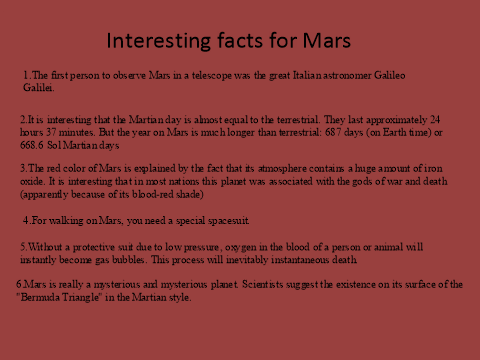
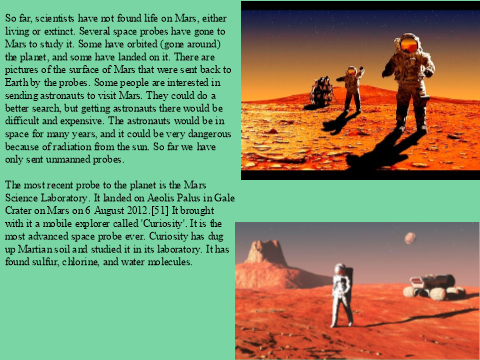
2. Teacher: thank you! And now we have Listening. Please, listen the text (10 хв)
Scientists are trying to get humans to Mars. Researchers from the U.S. space agency NASA are currently trying to find out what kind of plants could grow in the red soil on Mars. They hope that astronauts will be able to start growing their own food on the Red Planet. The journey to Mars could take up to two-and-a-half years. The astronauts will need to take a lot of food with them just to last for the journey. They will never be able to return to Earth, which means they will need to grow their own fruit, vegetables and other plants from seeds. NASA said there could be a problem because Mars doesn't have soil that is good for growing things. It just has red dust. Humans may be on their way to Mars in the next 15 years. NASA has been testing special "Martian gardens" to see what kind of things might grow on Mars. They have used a special soil made up of crushed volcanic rock. It contains no nutrients or organic material, so it is similar to the soil on Mars. The scientists managed to grow lettuce in it. They said the lettuce tasted normal, but it had weaker roots and took longer to grow. They will now try growing other vegetables. A NASA spokesman said: "Discoveries made in these Earth-based 'Martian gardens' will pave the way for
future studies and technology development in terms of reliable, efficient food production a long way from Earth."
Teacher: answer the questions
- Who is trying to get humans to Mars?
- What is the other name used for Mars in the article?
- How long will it take to get to Mars?
- What will astronauts use to grow plants?
- What does Mars not have that might cause problems growing things?
- Within how many years could the first humans be on Mars?
- What did scientists crush to get a soil similar to Mars?
- What vegetable did scientists grow in the soil?
- What part of the vegetable was weaker?
- What do scientists hope will become reliable and efficient?
Students give answers
3. Виконання вправ.
3.1 Яке з тверджень є правдивим, а яке ні. (4хв)
Teacher: now guess if 1-8 below are true (T) or false (F).
- NASA is looking at ways to get things to grow on Mars. T / F
- The article says Mars is also called the Black Planet. T / F
- It could take two-and-a-half years to get to Mars. T / F
- Astronauts will need to grow things on Mars from seeds. T / F
- Astronauts will not get to Mars until at least 2050. T / F
- Scientists used crushed salt rock because it is like the soil on Mars. T / F
- Scientists grew lettuce in volcanic dust and it tasted like normal lettuce. T / F
- Scientists want to pave a large part of Mars. T / F
Students give answers
3.2 Заповнити пропуски (8хв)
Teacher: put these words into the spaces in the paragraph below.
soil
return
agency
seeds
last
things
journey
own
Scientists are trying to get humans to Mars. Researchers from the U.S. space (1) ____________ NASA are currently trying to find out what kind of plants could grow in the red (2) ____________ on Mars. They hope that astronauts will be able to start growing their own food on the Red Planet. The (3) ____________ to Mars could take up to two-and-a-half years. The astronauts will need to take a lot of food with them just to (4) ____________ for the journey. They will never be able to (5) ____________ to Earth, which means they will need to grow their (6) ____________ fruit, vegetables and other plants from (7) ____________. NASA said there could be a problem because Mars doesn't have soil that is good for growing (8) ____________. It just has red dust.
Teacher: put these words into the spaces in the paragraph below.
material
way
pave
crushed
normal
reliable
kind
roots
Humans may be on their (9) ____________ to Mars in the next 15 years. NASA has been testing special "Martian gardens" to see what (10) ____________ of things might grow on Mars. They have used a special soil made up of (11) ____________ volcanic rock. It contains no nutrients or organic (12) ____________, so it is similar to the soil on Mars. The scientists managed to grow lettuce in it. They said the lettuce tasted (13) ____________, but it had weaker (14) ____________ and took longer to grow. They will now try growing other vegetables. A NASA spokesman said: "Discoveries made in these Earth-based 'Martian gardens' will (15) ____________ the way for future studies and technology development in terms of (16) ____________, efficient food production a long way from Earth.
Students give answers
4. Перегляд відео з каналу TED та його обговорення (13 хв)
Teacher: Planetary scientist Joel Levine shows some intriguing -- and puzzling -- new discoveries about Mars: craters full of ice, traces of ancient oceans, and compelling hints at the presence, sometime in the past, of life. He makes the case for going back to Mars to find out more. Lets watch the video!
https://www.ted.com/talks/joel_levine#t-152171
Students discuss the video, share their thoughts
5. Виконання тестових завдань ( 5 хв)
Teacher: We have task “MULTIPLE CHOICE”. Choose right answer
1) Who is trying to get humans to Mars?
a) scientists
b) Google
c) a rocket company
d) airline pilots
2) What is the other name used for Mars in the article?
a) Mercury
b) c-5fBx
c) the Red Plant
d) space agency
3) How long will it take to get to Mars?
a) 2½ months
b) 2½ years
c) 2½ decades
d) 2½ centuries
4) What will astronauts use to grow plants?
a) flower pots
b) fertiliser
c) boxes
d) seeds
5) What does Mars not have that might cause problems growing things?
a) good soil
b) rain
c) bamboo poles
d) greenhouses
6) Within how many years could the first humans be on Mars?
a) 12
b) 13
c) 14
d) 15
7) What did scientists crush to get a soil similar to Mars?
a) earth
b) volcanic rock
c) salt
d) seeds
8) What vegetable did scientists grow in the soil?
a) tomato
b) pumpkin
c) spinach
d) lettuce
9) What part of the vegetable was weaker?
a) the taste
b) the seeds
c) the roots
d) the leaves
10) What do scientists hope will become reliable and efficient?
a) technology
b) food production
c) Earth
d) development
6. Перегляд відео з каналу TED та його обговорення (13 хв)
Teacher: Nagin Cox is a first-generation Martian. As a spacecraft engineer at NASA's Jet Propulsion Laboratory, Cox works on the team that manages the United States' rovers on Mars. But working a 9-to-5 on another planet -- whose day is 40 minutes longer than Earth's -- has particular, often comical challenges. Lets watch the video! https://www.ted.com/talks/nagin_cox_what_time_is_it_on_mars
Students discuss the video, share their thoughts
Students give answers
IV. Підведення підсумків заняття (2хв)
Teacher : OK, let’s look at our aims again…
Did we achieve them?
Was the lesson interesting for you?
What did you like most?
What task was the most difficult for you?
Did you enjoy our excursion to Mars?
Did it help you to understand world better?
V.Домашнє завдання (2 хв)
Teacher: Write a letter to an expert on vegetable gardens on Mars. Ask him/her three questions about them. Give him/her three of your ideas on what humans can do to survive on Mars. Read your letter in your next lesson.
VI. Виставлення оцінок (2хв)
Teacher: OK, thank you for your answers. The lesson is over. Now I announce your marks.

про публікацію авторської розробки
Додати розробку
